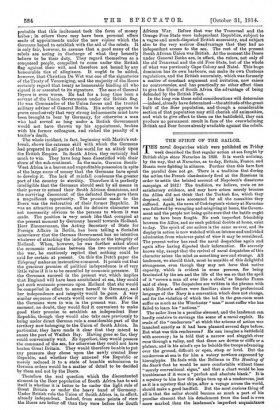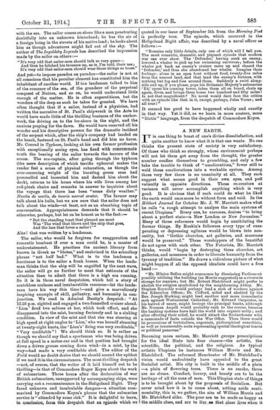THE SPIRIT OF THE SAILOR. T HE natal despatches which were
published on Friday week described the first regular action at sea fought by British ships since Navarino in 1826. It is worth noticing, by the way, that at Navarino, as to-day, Britain, France, and Russia were fighting in alliance. Further than this bare fact the parallel does not go. There is a tradition that during the action the French clandestinely fired at the Russians in order to settle the belated account of Napoleon's disastrous campaign of 1812! The tradition, we believe, rests on no satisfactory evidence, and may have arisen merely because the Allies did not think that the Turkish fire, which they despised, could have accounted for all the casualties they suffered. Again, the news of Codrington's victory at Navarino was followed by wrangling and misgiving at home, the Govern- ment and the people not being quite sure that the battle ought ever to have been fought. No such imperfect friendship between the Allies, and no such political doubts at home, exist to-day. The spirit of our sailors is the same as ever, and its display in action is now watched with an intense and undivided admiration from whatever point of view it may be considered. The present writer has read the naval despatches again and again after having digested their information. He scarcely knows why, except that the revival of naval despatches of this character seizes the mind as something new and strange. All landsmen, we should think, must be sensible of this delightful strangeness, even though they may not have that native capacity, which is evident in some persons, for being fascinated by the sea and the life of the sea so that the spell of it "covers a man all over like a cloak," as Sancho Panza said of sleep. The despatches are written in the phrases with which Nelson's sailors were familiar; since the professional language of the Navy is a convention which does not change, and for the violation of which the lad in the gun-room must suffer as much as the Winchester "man" must suffer who has failed to learn his "notions."
The sailor lives in a peculiar element, and the landsman can hardly contrive to envisage the scene of a naval exploit. He reads of the "rendezvous" at which the scheme of action was launched exactly as it had been planned several days before. But what was this rendezvous P He can imagine a battlefield with accuracy; he is told that a narrow and sluggish river runs through a valley, and that there are downs or cliffs or a plateau, and in his mind's eye he beholds the troops advancing over the ground, difficult or open, steep or level. But the rendezvous at sea is for him a watery nowhere expressed by hieroglyphs. He feels with the Bellman in The Hunting of the Snark that he would be more comfortable without these "merely conventional signs," and that a chart would be less troublesome if it were a "perfect and absolute blank." It is a mystery to him how the ships turn up at a rendezvous, just as it is a mystery that ships, after a voyage across the world, should make a good landfall. But the most curious thing of all is that the sailor should become so much a part of his peculiar element that his detachment from the land is even more marked than the landsman's imperfect acquaintance
with the sea. The sailor comes on shore like a man penetrating doubtfully into an unknown hinterland ; he has the air of a foreign being in the streets of his native land ; he looks about him as though adventures might fall out of the sky. The author of The Ingoldsby Legends has described the impression made by the sailor on others :—
"It's very odd that sailor-men should talk so very queer—
And then he hitched his trousers up, as is, I'm told, their use ;
It's very odd that sailor-men should wear those things so loose." And yet—to impose paradox on paradox—the sailor is not at all conscious that his peculiar element has constituted him the inhabitant of another world. If ice landsman talked to him of the romance of the sea, of the grandeur of the perpetual conquest of Nature, and so on, he would understand little enough of the matter. He is often superstitious, but the wonders of the deep as such he takes for granted. We have often thought that if a sailor, instead of a physician, had written the narrative of St. Paul's shipwreck in the Acts he would have made little of the thrilling business of the anchor- work, the driving on to the lee-shore in the night, and the anxious praying for the dawn. He would have reserved all his wonder and his descriptive powers for the dramatic incident of the serpent which, after the ship's company had landed on the beach, fastened on St. Paul's hand and did him no harm. Mr. Conrad in Typhoon, looking at his own former profession with exceptionally seeing eyes, has fixed with congummate truth the bearing of the sailor towards the terrors of the ocean. The sea-captain, after going through the typhoon (the mere description of which terrific upheaval makes the reader feel a sense of physical exhaustion, as though the ever-recurring weight of the bursting green seas had pommelled and lacerated him and dashed him about the deck), returns to his home where his wife lives among her red-plush chairs and remarks in answer to inquiries about the voyage that there has been "some dirty weather." Narita de ventis, de tauris narrat arator. The farmer may talk about his bulls, but we are sure that the sailor does not talk about the winds—at least, not as an absorbing topic of conversation. Appropriateness demands that it should be otherwise, perhaps, but let us be honest as to the fact :- "But the standing toast that pleased me most
Was 'The wind that blows and the ship that goes,
And the lass that loves a sailor 1'" Alas ! that was written by a landsman.
The sailor, who would be forgiven for exaggeration and romantic bombast if ever a man could be, is a master of understatement. He practises the ancient literary form known in Greek as "litotes," and enshrined in the schoolboy phrase "not half bad." What is to the landsman a hurricane is to the sailor a fresh breeze. When the lands- man thinks that the ship will be engulfed by the next wave, the sailor will go no further to meet that estimate of the situation than to admit that there is a high sea running. So it is in these naval despatches, which tell a story of matchless coolness and inexhaustible resource—let the lands- man have his way this time !—and give a marvellously inspiring example of skill, gallantry, and humanity in con- junction. We read in Admiral Beatty's despatch : "At 1156 p.m. sighted and engaged a two-funnelled cruiser ahead. 'Lion' fired two salvoes at her, which took effect, and she disappeared into the mist, burning furiously and in a sinking condition. In view of the mist and that she was steering at high speed at right angles to 'Lion,' who was herself steaming at twenty-eight knots, the Lion's' firing was very creditable." "Very creditable "! We should think so. It is rather as though we should say that a sportsman who was being driven at full speed in a motor-car and in that position had brought down a driven grouse coming down wind—in a mist, by the way—had made a very creditable shot. The editor of the Field would no doubt desire that we should amend the epithet if we used it in the circumstances. The most thrilling despatch —not, of course, that the writer of it laid himself out to be thrilling—is that of Commodore Roger Keyes about the work of submarines. Three hours after the declaration of war British submarines, unsupported by accompanying ships, were carrying out a reconnaissance in the Heligoland Bight. They faced unknown and incalculable dangers—a situation sum- marized by Commodore Keyes's phrase that the submarine service is " attended by some risk." It is delightful to learn, in conolusien, from this despatch that an epj.sode which we
quoted in our issue of September 5th from the Morning Post is perfectly true. The episode, which occurred in the Heligoland Bight affair, was described by a naval officer as follows :—
"Remains only little details, only one of which will I tell you. The most romantic, dramatic, and piquant episode that modern war can ever show. The 'Defender,' having sunk an enemy, lowered a whaler to pick up her swimming survivors ; before the whaler got back an enemy's cruiser came up and chased the 'Defender,' and thus she abandoned her whaler. Imagine their feelings : alone in an open boat without food, twenty-five miles from the nearest land, and that land the enemy's fortress, with nothing but fog and foes around them. Suddenly a swirl along- side and up, if you please, pops his Britannic Majesty's submarine E4,' opens his conning tower, takes them all on board, shuts up again, dives, and brings them home two hundred and fifty miles ! Is not that magnificent ? No novel would dare face the critics with an episode like that in it, except, perhaps, Jules Verne ; and all true ! "
It seemed too good to have happened wholly and exactly in that way. Yet it did, as we learn in more austere, more "litotio " language, from the despatch of Commodore Keyes.



































 Previous page
Previous page